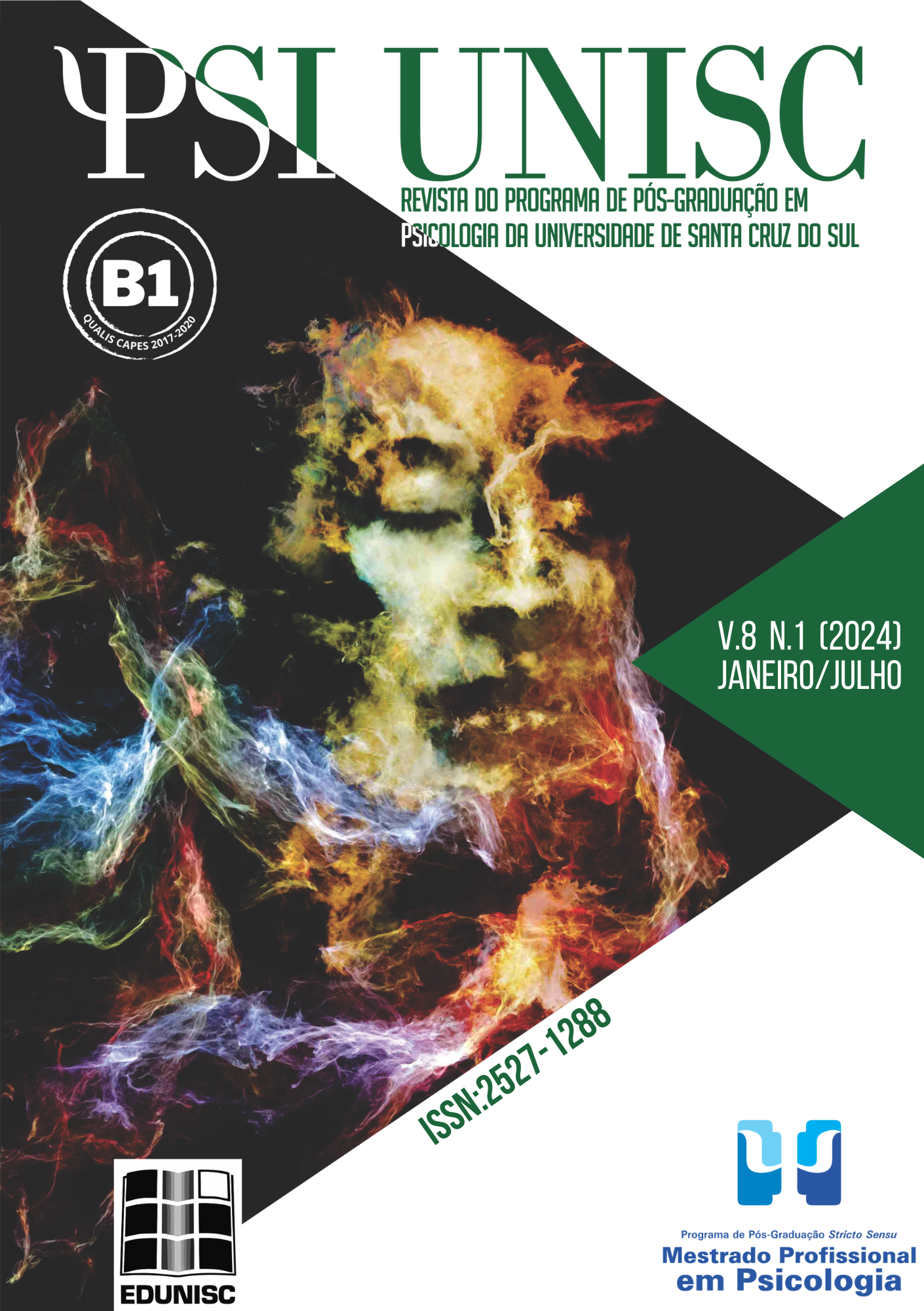Evidências de validade da escala de antecipação do estigma relacionado ao HIV
DOI:
https://doi.org/10.17058/psiunisc.v8i1.18479Palavras-chave:
HIV, testagem, estigma, preconceito, comportamento sexualResumo
O estigma relacionado ao HIV é um dos principais fatores associados a desfechos negativos entre pessoas que vivem com HIV, como evitação de testagem e baixa adesão ao tratamento. O objetivo deste estudo é apresentar as evidências de validade da Escala de Antecipação do Estigma Relacionado ao HIV (EAER-HIV-7) no contexto brasileiro. Participaram do estudo 428 homens, em sua maioria brancos e heterossexuais. Os participantes responderam a um protocolo contendo dados sociodemográficos, a EAER-HIV-7, a Escala de Preconceito Contra Diversidade Sexual e de Gênero (EPCDSG), um questionário de conhecimentos sobre a transmissão do HIV e questões sobre percepção de risco de infecção por HIV. Foi realizada tradução e adaptação transcultural da EAER-HIV-7. Para analisar os dados, foram utilizados testes t para avaliar a validade convergente e entre grupos, bem como análise fatorial confirmatória (CFA) para investigar a estrutura fatorial. O modelo unidimensional da EAER-HIV-7 testado apresentou bons índices de ajuste. Os resultados indicam boas evidências de fidedignidade da EAER-HIV-7, sugerindo sua aplicabilidade no contexto brasileiro. Sugere-se que mais estudos sejam conduzidos em populações diversas, como mulheres, idosos, pessoas LGBTQIA+ e indivíduos casados, de modo a oferecer novas versões da ferramenta.
Downloads
Referências
Aggleton, P., Parker, R. G., & Maluwa, M. (2003). Stigma, discrimination and HIV/AIDS in Latin America and the Caribbean. Inter-American Development Bank, Sustainable Development Department.
Albuquerque, G. A., Garcia, C. D. L., Alves, M. J. H., Queiroz, C. M. H. T. D., & Adami, F. (2013). Homossexualidade e o direito à saúde: Um desafio para as políticas públicas de saúde no Brasil. Saúde em Debate, 37(98) 516-524. https://www.scielo.br/j/sdeb/a/JhwFvPRq3LCSQTqkLgtHZ7f/abstract/?lang=pt
Azevedo, F. M. de, Almeida-Segundo, D. S. de, Feijó, M., Nardi, H. C., & Costa, A. B. (2020). Atribuições de Causalidade pela Infecção por HIV. Estudos e Pesquisas Em Psicologia, 20(3), 751–769. https://doi.org/10.12957/epp.2020.54346
Berger, B. E., Ferrans, C. E., & Lashley, F. R. (2001). Measuring stigma in people with HIV: Psychometric assessment of the HIV stigma scale. Research in nursing & health, 24(6), 518-529. https://doi.org/10.1002/nur.10011
Brasil. (2011). Ministério da Saúde. Secretaria de Vigilância em Saúde. Departamento de DST, Aids e Hepatites Virais. Pesquisa de conhecimento, atitudes e práticas na população brasileira. Brasília: Ministério da Saúde.
Brasil. (2020). Boletim HIV/AIDS 2020. Boletim Epidemiológico. Secretaria de Vigilância em Saúde. Ministério da Saúde, número especial, dez. 2020. https://www.gov.br/saude/pt-br/centrais-de-conteudo/publicacoes/boletins/epidemiologicos/especiais/2020/boletim-hiv_aids-2020-internet.pdf
Borsa, J. C., Damásio, B. F., & Bandeira, D. R. (2012). Adaptação e validação de instrumentos psicológicos entre culturas: Algumas considerações (22nd ed.). Paidéia.
Brown, T. A. (2015). Confirmatory factor analysis for applied research. The Guilford Press.
Browne, M., & Cudeck, R. (1993). Alternative ways of assessing model fit. In K. A. Bollen and J. S. Long (Eds.). Testing structural equation models. Newbury Park.
Catelan, R. F., Azevedo, F. M., Sbicigo, J. B., Vilanova, F., Silva, L.P., Zanella, G. I., ... Nardi, H. C. (2020). Anticipated HIV stigma and delays in HIV testing among Brazilian heterosexual male soldiers. Psychology & Sexuality, 1-14. https://doi.org/10.1080/19419899.2020.1773909
Cazeiro, F., Silva, G. S. N. & Souza, E. M. F. (2021). Necropolítica no campo do HIV: algumas reflexões a partir do estigma da Aids. Ciência & Saúde Coletiva [online], 26, 5361-5370. https://doi.org/10.1590/1413-812320212611.3.00672020
Costa, A. B., Machado, W. de L., Bandeira, D. R., & Nardi, H. C. (2016). Validation Study of the Revised Version of the Scale of Prejudice Against Sexual and Gender Diversity in Brazil. Journal of Homosexuality, 63(11), 1446–1463. https://doi.org/10.1080/00918369.2016.1222829
Costa, A. B., Moura Filho, J. B., Silva, J. M., Beloqui, J. A., Espindola, Y., de Araujo, C. F., ... & de Lima, C. E. (2022). Key and general population HIV-related stigma and discrimination in HIV-specific health care settings: Results from the Stigma Index Brazil. AIDS care, 34(1), 16-20. https://doi.org/10.1080/09540121.2021.1876836
Costa, A. B., Viscardi, L. H., Feijo, M., & Fontanari, A. M. V. (2022). HIV Voluntary Counseling and Testing (VCT-HIV) effectiveness for sexual risk-reduction among key populations: A systematic review and meta-analysis. EClinicalMedicine, 52. https://doi.org/10.1016/j.eclinm.2022.101612
Davis, C., Sloan, M., Macmaster, S., & Hughes, L. (2007). The International AIDS Questionnaire—English Version (IAQ-E): Assessing the Validity and Reliability. Journal of HIV/AIDS Prevention in Children & Youth, 7(2), 29–42. https://doi.org/10.1300/J499v07n02_03
Earnshaw, V. A., Bogart, L. M., Dovidio, J. F., & Williams, D. R. (2015). Stigma and racial/ethnic HIV disparities: Moving toward resilience. Stigma and Health, 1(S), 60–74. https://doi.org/10.1037/2376-6972.1.S.60
Earnshaw, V. A., & Chaudoir, S. R. (2009). From Conceptualizing to Measuring HIV Stigma: A Review of HIV Stigma Mechanism Measures. AIDS and Behavior, 13(6), 1160. https://doi.org/10.1007/s10461-009-9593-3
Fontanari, A. M. V., Zanella, G. I., Feijo, M., Churchill, S., Lobato, M. I. R., & Costa, A. B. (2019). HIV-related care for transgender people: A systematic review of studies from around the world. Social science & medicine, 230, 280-294. https://doi.org/10.1016/j.socscimed.2019.03.016
Froman, R. D., Owen, S. V., & Daisy, C. (1992). Development of a Measure of Attitudes Toward Persons with AIDS. The Journal of Nursing Scholarship, 24(2), 149–152. https://doi.org/10.1111/j.1547-5069.1992.tb00240.x
Genberg, B. L., Kawichai, S., Chingono, A., Sendah, M., Chariyalertsak, S., Konda, K. A., & Celentano, D. D. (2008). Assessing HIV/AIDS Stigma and Discrimination in Developing Countries. AIDS and Behavior, 12(5), 772–780. https://doi.org/10.1007/s10461-007-9340-6
Golub, S. A., & Gamarel, K. E. (2013). The impact of anticipated HIV stigma on delays in HIV testing behaviors: findings from a community-based sample of men who have sex with men and transgender women in New York City. AIDS Patient Care and STDs, 27(11), 621-627. https://doi.org/10.1089/apc.2013.0245
Golub, S. A., Fikslin, R. A., Goldberg, M. H., Peña, S. M., & Radix, A. (2019). Predictors of PrEP uptake among patients with equivalent access. AIDS and Behavior, 23(7), 1917-1924. https://doi.org/10.1007/s10461-018-2376-y
Hamann, C., Pizzinato, A., Weber, J. L. A., & Rocha, K. B. (2017). Narrativas sobre risco e culpa entre usuários e usuárias de um serviço especializado em infecções por HIV: Implicações para o cuidado em saúde sexual. Saúde e Sociedade, 26(3), 651-663. https://doi.org/10.1590/s0104-12902017170669
Harrell, J. P., & Wright, L. W. (1998). The development and validation of the Multicomponent AIDS Phobia Scale. Journal of Psychopathology and Behavioral Assessment, 20(3), 201-216. https://doi.org/10.1023/A:1023020617248
Herek, G. M. (1999). AIDS and stigma. American behavioral scientist, 42(7), 1106-1116. https://doi.org/10.1177/0002764299042007004
Herek, G. M., Saha, S., & Burack, J. (2013). Stigma and psychological distress in people with HIV/AIDS. Basic and Applied Social Psychology, 35(1), 41-54. https://doi.org/10.1080/01973533.2012.746606
Kalichman, S. C., Simbayi, L. C., Jooste, S., Toefy, Y., Cain, D., Cherry, C., & Kagee, A. (2005). Development of a Brief Scale to Measure AIDS-Related Stigma in South Africa. AIDS and Behavior, 9(2), 135–143. https://doi.org/10.1007/s10461-005-3895-x
Link, B. G., & Phelan, J. C. (2001). Conceptualizing Stigma. Annual Review of Sociology, 27(1), 363–385. https://doi.org/10.1146/annurev.soc.27.1.363
Luz, P. M., Torres, T. S., Almeida-Brasil, C. C., Marins, L. M. S., Bezerra, D. R. B., Veloso, V. G., ... Thombs, B. D. (2020). Translation and validation of the Short HIV Stigma scale in Brazilian Portuguese. Health and Quality of Life Outcomes, 18(1), 322. https://doi.org/10.1186/s12955-020-01571-1
Mulford, C. L., & Lee, M. Y. (1996). Reliability and Validity of Aids Victim Blaming Scales. Psychological Reports, 79(1), 191–201. https://doi.org/10.2466/pr0.1996.79.1.191
O’Hea, E. L., Sytsma, S. E., Copeland, A., & Brantley, P. J. (2001). The Attitudes Toward Women with HIV/AIDS Scale (ATWAS): Development and Validation. AIDS Education and Prevention, 13(2), 120–130. https://doi.org/10.1521/aeap.13.2.120.19738
Pelúcio, L., & Miskolci, R. (2009). A prevenção do desvio: o dispositivo da aids e a repatologização das sexualidades dissidentes. Sexualidad, Salud y Sociedad-Revista Latinoamericana, (1) 125-157. Recuperado de https://www.redalyc.org/pdf/2933/293322961007.pdf
Rhemtulla, M., Brosseau-Liard, P. E., & Savalei, V. (2012). When can categorical variables be treated as continuous? A comparison of robust continuous and categorical SEM estimation methods under suboptimal conditions. Psychological methods, 17(3), 354. https://doi.org/10.1037/a0029315
Shrum, J., Turner, N., & Bruce, K. (1989). Development of an instrument to measure attitudes towards AIDS. AIDS Education and Prevention.
Starks, T. J., Rendina, H. J., Breslow, A. S., Parsons, J. T., & Golub, S. A. (2013). The psychological cost of anticipating HIV stigma for HIV-negative gay and bisexual men. AIDS and Behavior, 17(8), 2732-2741. https://doi.org/10.1007/s10461-013-0425-0
Suit, D., & Pereira, M. E. (2008). Vivência de estigma e enfrentamento em pessoas que convivem com o HIV. Psicologia USP, 19, 317-340. https://doi.org/10.1590/S0103-65642008000300004
Tang, W., Wei, C., Cao, B., Wu, D., Li, K. T., Lu, H., ... Tucker, J. D. (2018). Crowdsourcing to expand HIV testing among men who have sex with men in China: a closed cohort stepped wedge cluster randomized controlled trial. PLoS medicine, 15(8). https://doi.org/10.1371/journal.pmed.1002645
Vilanova, F., de Azevedo, F. M., & Steins, G. (2023). A Bayesian Network Perspective on an Attributional Model of Reactions Toward People with HIV. Actualidades en Psicología, 37(134), 117-133. https://doi.org/10.15517/ap.v37i134.46758
Warner, M. (1993). Fear of a queer planet. Queer Politics and Social Theory. University of Minnesota Press.
Worthen, M. G. (2016). Hetero-cis–normativity and the gendering of transphobia. International Journal of Transgenderism, 17(1), 31-57. https://doi.org/10.1080/15532739.2016.1149538
Xiao, W., Yan, L., Chen, L., Fu, G., Yang, H., Yang, C., ... Wei, C. (2020). Sexual network distribution of HIV self-testing kits: Findings from the process evaluation of an intervention for men who have sex with men in China. PLoS One, 15(4). https://doi.org/10.1371/journal.pone.0232094
Zelaya, C. E., Sivaram, S., Johnson, S. C., Srikrishnan, A. K., Solomon, S., & Celentano, D. D. (2008). HIV/AIDS Stigma: Reliability and Validity of a New Measurement Instrument in Chennai, India. AIDS and Behavior, 12(5), 781–788. https://doi.org/10.1007/s10461-007-9331-7
Downloads
Publicado
Como Citar
Edição
Seção
Licença
A submissão de originais para este periódico implica na transferência, pelos autores, dos direitos de publicação impressa e digital. Os direitos autorais para os artigos publicados são do autor, com direitos do periódico sobre a primeira publicação. Os autores somente poderão utilizar os mesmos resultados em outras publicações indicando claramente este periódico como o meio da publicação original. Em virtude de sermos um periódico de acesso aberto, permite-se o uso gratuito dos artigos em aplicações educacionais e científicas desde que citada a fonte conforme a licença CC-BY da Creative Commons.




